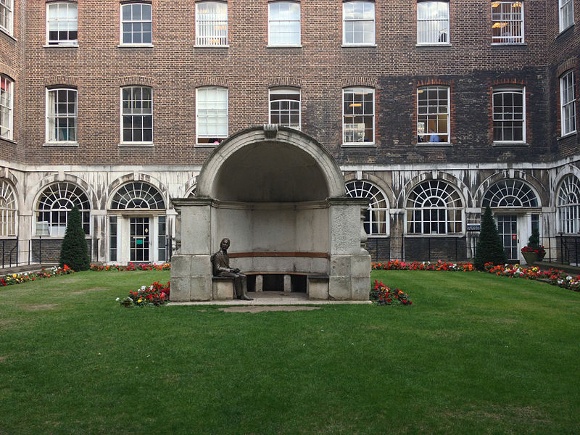John Keats, selected poems Contents
- Social and political context
- Religious and philosophical context
- Literary context
- Bright Star! Would I were steadfast as thou
- The Eve of St Agnes
- ‘Hush, hush! tread softly! hush, hush, my dear!’
- Isabella: or The Pot of Basil
- La Belle Dame Sans Merci
- Lamia
- Lines to Fanny (‘What can I do to drive away’)
- O Solitude, if I must with thee dwell
- Ode on a Grecian Urn
- Ode on Indolence
- Ode to a Nightingale
- Ode to Autumn
- Ode to Melancholy
- Ode to Psyche
- On First Looking Into Chapman’s Homer
- On Seeing the Elgin Marbles
- On the Sea
- Sleep and Poetry
- Time’s sea hath been five years at its slow ebb
- To Ailsa Rock
- To Leigh Hunt
- To Mrs Reynolds’s Cat
- To My Brothers
- To Sleep
- When I have fears that I may cease to be
O Solitude, if I must with thee dwell: Synopsis and commentary
Synopsis of O Solitude
The speaker expresses his desire in the initial octet that if he must live in solitude, then he would rather be alone in nature than in the squalid ugliness of a city.
In the subsequent sestet he says that, although he would gladly dwell alone in nature, he would much prefer to have the companionship of a ‘kindred spirit’.
Commentary on O Solitude
 This poem dates from October 1815, shortly after Keats had joined Guy’s Hospital as a surgical pupil. This entailed a move from Edmonton to Southwark. This area south of the Thames was, in Keats’ day, dirty, rough, insanitary and overcrowded. It had a shifting population and there was rampant crime. To become an apothecary Keats would have to undergo at least six months’ attendance at the hospital, attending lectures and walking the wards, in order to obtain his licence. Keats was clearly very anxious about the prospect and this sonnet expresses his depression and longing to escape.
This poem dates from October 1815, shortly after Keats had joined Guy’s Hospital as a surgical pupil. This entailed a move from Edmonton to Southwark. This area south of the Thames was, in Keats’ day, dirty, rough, insanitary and overcrowded. It had a shifting population and there was rampant crime. To become an apothecary Keats would have to undergo at least six months’ attendance at the hospital, attending lectures and walking the wards, in order to obtain his licence. Keats was clearly very anxious about the prospect and this sonnet expresses his depression and longing to escape.A knowledge of Keats’ personal circumstances - a sensitive young man living in the rough, insalubrious district of Southwark, seeing daily disease and suffering in Guy’s Hospital – make this address to solitude, the desire for escape to the countryside and the yearning for a kindred spirit with whom he could share his life – all the more understandable.
Glossary
steep: mountainside
Nature’s observatory: natural vantage-point from which to observe the stars and landscape
span: the length of an outstretched hand between the tips of the thumb and the little finger
vigils: periods of keeping awake during the night, especially to keep watch or to pray
pavilioned: The branches are like a light ornamental roof, creating an ornate tracery.
two kindred spirits: It is unclear whom Keats is referring to here. His companion could have been his friend George Felton Mathew – or it could have been one of Keats’ brothers. The companion could also have been imaginary.
Investigating commentary on O Solitude
- In what ways does knowledge of Keats’ personal circumstances help the reader to understand the sentiments expressed in this poem?
- How do you think this poem expresses the creative personality of its writer?
1. A group of eight lines of verse. See octave. (Also: 2. A group of eight people or things. 3. A group of eight musical performers. 4. A piece for eight musical performers.)
The 6-line stanza of a Petrarchan sonnet, occupying the last six lines, sometimes divided into tercets or couplets. It often resolves the problem posed in the octave or comments significantly on it.
Recently Viewed
-
John Keats, selected poems » O Solitude, if I must with thee dwell: Synopsis and commentary
just now -
John Keats, selected poems » The Eve of St Agnes - Synopsis and commentary
just now -
John Keats, selected poems » To Mrs Reynolds’s Cat: Synopsis and commentary
just now -
John Keats, selected poems » Keats’ literary career
just now -
A-Z: General definitions » Cupid
just now -
John Keats, selected poems » To Mrs Reynolds’s Cat: Language, tone and structure
just now -
John Keats, selected poems » Ode to Psyche: Language, tone and structure
just now -
John Keats, selected poems » Ode on Indolence: Language, tone and structure
just now -
John Keats, selected poems » Lamia: Language, tone and structure
just now -
John Keats, selected poems » The Eve of St Agnes - Language, tone and structure
just now -
A-Z: General definitions » Theologian
just now -
John Keats, selected poems » On Seeing the Elgin Marbles: Language, tone and structure
just now -
John Keats, selected poems » Revolution and war
just now
